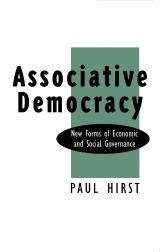Details

Associative Democracy
New Forms of Economic and Social Governance1. Aufl.
|
18,99 € |
|
| Verlag: | Wiley |
| Format: | |
| Veröffentl.: | 03.06.2013 |
| ISBN/EAN: | 9780745677484 |
| Sprache: | englisch |
| Anzahl Seiten: | 230 |
DRM-geschütztes eBook, Sie benötigen z.B. Adobe Digital Editions und eine Adobe ID zum Lesen.
Beschreibungen
In this book Paul Hirst makes a major contribution to democratic thinking, advocating "associative democracy"; the belief that human welfare and liberty are best served when as many of the affairs of society as possible are managed by voluntary and democratically self-governing associations.
Acknowledgements. <p>1. A Changed Conjuncture.</p> <p>2. Associative Principles and Democratic Reform.</p> <p>3. Associational Ethics and Logics of Collective Action.</p> <p>4. Associative Democracy and Economic Governance.</p> <p>5. Current Realities and Economic Reform.</p> <p>6. Thick Welfare, Thin Collectivism.</p> <p>7. An Associational and Confederal Welfare State.</p> <p>Reference.</p> <p>Suggestions for Further Reading.</p> <p>Index.</p>
'Who speaks against democracy? No one. But unthinking consensus is a danger; turning a still novel concept into a received idea. By contrast Paul Hirst shows how difficult and important the term is, how contested its content still remains, and how significant are its links to the economy as well as the polity. His major study confirms that democracy has only just arrived. <i>Associative Democracy</i> will be a benchmark for the debate over where democracy can, and should, lead human society.' <i>Anthony Barnett, Co-ordinator Charter 88</i> <p>'This is an important and invigorating contribution to ongoing debates about welfare and governance in contemporary Western societies. It deserves to be widely read.' <i>Political Studies Association</i></p> <p>'Representative government and corporate bureaucracy have dominated the 20th century. In this book Paul Hirst has the bold ambition of reviving the alternative 19th century traditions of pluralism, co-operation and voluntary association to complement if not replace them. But he modifies these alternatives both in theory and by reference to recent institutional experiment. It is an attractive prospect, delineated with force and learning.' <i>James Cornford, Institute for Public Policy Research</i></p> <p>'This very clearly written and original book should play a key role in the increasingly intense, and hopefully productive, argument about the revitalisation of democratic systems.' <i>Sociology</i></p> <p>'Hirst defends his proposal with commendable confidence and vigour. It has a pleasing plausibility, and it is good to see genuinely radical suggestions being advanced at the present time.' <i>Radical Philosophy</i></p> <p>'... This persuasive book, ... full of sharp insights.' <i>British Journal of Sociology</i></p>
<b>Paul Hirst</b> is Professor of Social Theory, Birkbeck College, University of London.
Western societies are suffering from a multi-faceted political and economic crisis to which traditional ideologies of the Left and Right no longer offer viable solutions. <p>This book advocates as an alternative 'associative democracy'. Far from being a utopian idea, it offers new forms of economic and social governance as supplements to representative democracy and market economies. Associative democracy addresses the problems of the overload of big government by democratizing and empowering civil society. It transfers social provision to self-governing voluntary associations, whilst retaining public funding and political accountability. It 'publicises' civil society, placing political responsibility and governmental tasks in the hands of citizens. Accountable government becomes possible because service performance and public control are separated. In the economic sphere it advocates regional economic regulation through public-private partnerships, the promotion of self-governing industrial districts, and the democratization of the firm.</p> <p>In this way, Hirst argues, public regulation can be made less remote, promoting the growth of relationships based on co-operation and trust and, therefore, ensuring those flows of information and commitment on the part of actors necessary to the pursuit of "quality" in market economies.</p> <p>This book is highly distinctive in the way it combines political theory with social analysis and political advocacy. It forms an outstanding contribution to contemporary political discussion.</p>

















